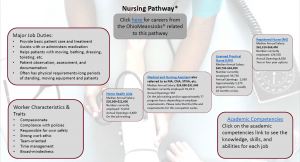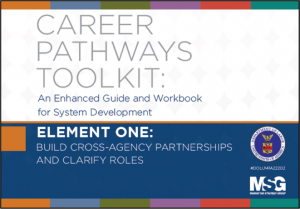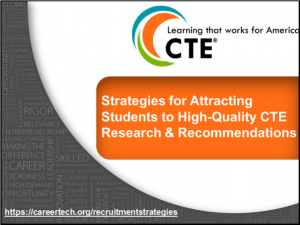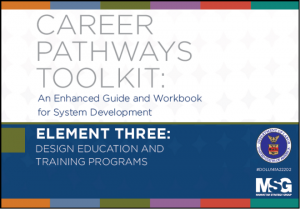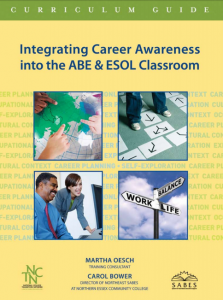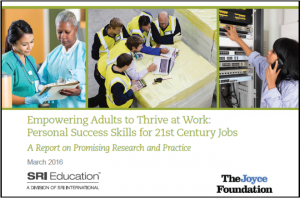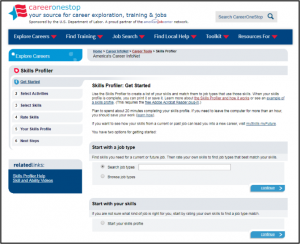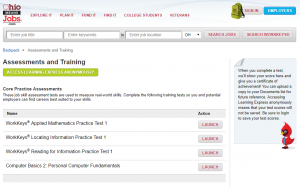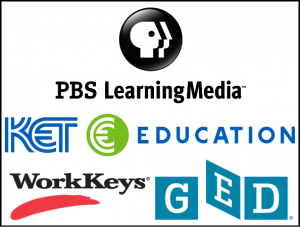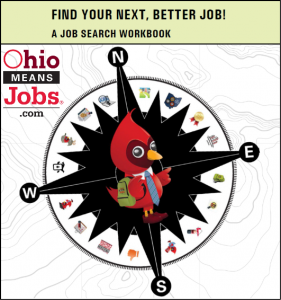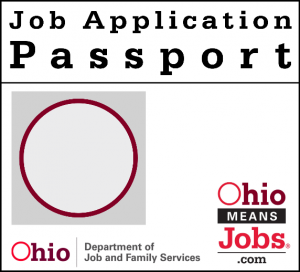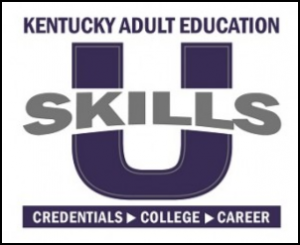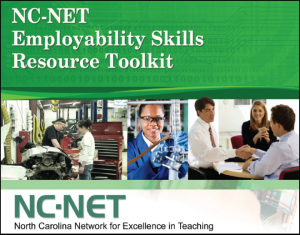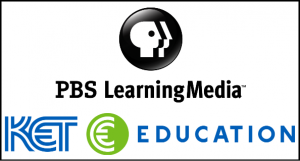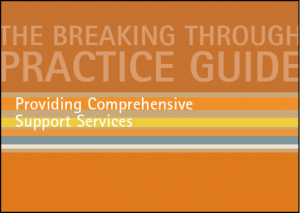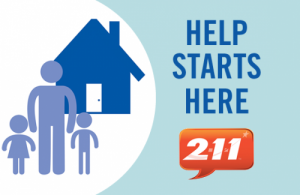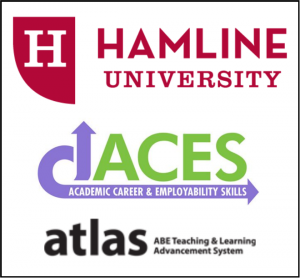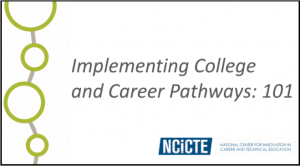Resources for Teachers
Career Ladders
This resource, from the Ohio Aspire Professional Development Network, is a statewide view of two career pathways based on Ohio Means Jobs® data. Additionally, a blank template has been developed for programs that would like to create regional-specific pathway(s). The career ladders allow program staff to demonstrate to students how they might progress through a particular pathway. The two developed ladders are as follows:
The ladders illustrate a possible career progression along with the median annual salary for the state of Ohio, the number currently employed, and the projected annual openings as well as the type of training an individual should expect to obtain for that job. Knowledge, skills, abilities, and WorkKeys scores are also provided for each job.
Partnerships and Alignment
This component of the Career Pathways Toolkit, from the U.S. Department of Labor, provides tools and techniques for
- Engaging Cross-Agency Partners and Employers;
- Establishing a Shared Vision, Mission, Goals, and Strategies;
- Defining the Roles and Responsibilities of all Partners; and
- Developing a Work Plan and/or Memorandum of Understanding for the Partnership.
Areas of particular interest to Ohio Aspire administrators and program staff are the checklists and worksheets for identifying potential partners, taking inventory of current partnerships, and clarifying the roles and responsibilities of partners – all of which may be used during the development of a Career Pathways Plan.
Promotion, Environment, Intake, and Orientation
This website, from Advance CTE and the Siemens Foundation, houses a number of resources designed to help states and local communities attract and recruit students into high-quality career and technical education (CTE) programs. The two-pronged approach of sharing information about the benefits of CTE and recruiting students into CTE programs provides tools to support effective messaging to prospective students and stakeholders, such as local partners.
Areas of particular interest to Ohio Aspire administrators and program staff include brief fact sheets (such as The Value and Promise of Career Technical Education) that provide research and recruitment activities programs can use when sharing career pathways information with prospective and enrolled students.
This component of the Career Pathways Toolkit, from the U.S. Department of Labor, provides tools and techniques for researching and promoting work-based learning opportunities within business and industry.
Areas of particular interest to Ohio Aspire administrators and program staff include
- Component 3.1: Identify and Engage Education and Training Partners;
- Component 3.2: Identify Target Populations, Entry Points, and Recruitment Strategies; and
- Component 3.6: Research and Promote Work-Based Learning Opportunities within Business and Industry.
Individual Education, Career, and Life Plans
This curriculum guide, from National College Transition Network and SABES (System for Adult Basic Education Support), was created to provide adult education instructors tools and training to help students think about and plan for their life and career beyond the classroom. The guide includes classroom-ready resources, flexible lesson plans, handouts, and online resources to guide students through the career awareness and planning process.
Since the guide is comprised of individual lessons organized into units, Ohio Aspire administrators and program staff are encouraged to look at lesson titles to determine which lessons best meet the needs of students in their program.
This report, from SRI Education and the Joyce Foundation, emphasizes what it identifies as personal success skills – the Joyce Foundation’s chosen term to describe a multitude of elements (e.g., basic job readiness, self-directed learning, self-management, personal responsibility, effective communication, career management, and everyday problem solving) and the competencies needed to lay the foundation for personal success and navigate the working world.
Areas of particular interest to Ohio Aspire administrators and program staff include Chapter 5: Recommendations which sum up the principles of how adults learn and the approaches instructors can use to implement those principles with their students.
This interactive tool, from CareerOneStop, helps students and instructors inventory and list their workplace skills and activities as well as match those skills to career options.
Areas of particular interest to Ohio Aspire instructors and program staff include
- Basic Skills (e.g., active listening, math, speaking, science, reading comprehension),
- Social Skills (e.g., negotiation, persuasion, service orientation),
- Technical Skills (e.g., equipment maintenance, technology design, troubleshooting), and
- Resource Management Skills (e.g., time management, financial and material resource management).
Ongoing Assessment and Learning
This resource, from OhioMeansJobs.com, contains a collection of online practice tests and skill improvement resources for students in Ohio Aspire programs.
Areas of particular interest to Ohio Aspire instructors and program staff include The Applied Mathematics collection with four leveled modules, each of which is accompanied by Support Materials such as high school equivalency assessments, WorkKeys, ASVAB (Armed Services Vocational Aptitude Battery); career tests, including Nursing, Plumbing, Emergency Medical Technician (EMT), and Electrical; and modules to help improve computer, writing, and math skills.
This collection of resources, which originally appeared in KET’s (Kentucky Educational Television) Workplace Essential Skills and GED® Connection series and accompanying workbooks, is designed to help students locate information in commonly used graphics.
Areas of particular interest to Ohio Aspire instructors and program staff include
- Background Essay describing the types of materials students may encounter in the workplace and why being able to effectively navigate and draw conclusions from graphic representations of information is an important workplace skill;
- Connections Video that shares engaging, real-life examples of locating information;
- Discussion Questions for further exploration and application in the classroom;
- Teacher Resources, including Resource Correlations to WorkKeys® Assessments;
- Student Handouts;
- Teaching Tips to help instructors make the most of the resource collection; and
- Education Standards, including the College and Career Readiness Standards for Adult Education (CCRs).
This collection of resources, which originally appeared in KET’s (Kentucky Educational Television) Workplace Essential Skills and GED® Connection series and accompanying workbooks, is designed to help students understand and apply what they have read.
Areas of particular interest to Ohio Aspire instructors and program staff include
- Background Essay describing the types of materials students may encounter in the workplace and why being able to effectively read, understand, and apply the information they encounter is an important workplace skill;
- Connections Video that shares engaging, real-life examples of reading for information;
- Discussion Questions for further exploration and application in the classroom;
- Teacher Resources, including Resource Correlations to WorkKeys® Assessments;
- Student Handouts; and
- Teaching Tips to help instructors make the most of the resource collection.
This collection of resources, which originally appeared in KET’s (Kentucky Educational Television) Workplace Essential Skills and GED® Connection series and accompanying workbooks, is designed to help students with math skills.
Areas of particular interest to Ohio Aspire instructors and program staff include The Applied Mathematics collection includes four leveled modules, each of which is accompanied by Support Materials, including:
- Background Essay describing applied math, providing the rationale for its importance as a workplace skill, as well as practical examples of applied math in context;
- Connections Video that shares engaging, real-life examples of applied math at work;
- Discussion Questions for further exploration and application in the classroom;
- Teacher Resources, including Resource Correlations to WorkKeys® Assessments;
- Student Handouts; and
- Teaching Tips to help instructors make the most of the resource collection.
Career Advising
This curriculum guide, from National College Transition Network and SABES (System for Adult Basic Education Support), was created to provide adult education instructors tools and training to help students think about and plan for their life and career beyond the classroom. The guide includes classroom-ready resources, flexible lesson plans, handouts, and online resources to guide students through the career awareness and planning process.
Since the guide is comprised of individual lessons organized into units, instructors are encouraged to look at lesson titles to determine which lessons best meet the needs of students in their program.
Areas of particular interest to Ohio Aspire instructors and program staff for career advising are the lessons in Section III: Occupational Exploration.
This workbook, developed by the Ohio Department of Job and Family Services, improves student success with job searches by providing guidance on thinking outside the box, making good first impressions, discovering job postings that may not be listed online, crafting a resume, completing a job application, and putting their best foot forward during a job interview.
Areas of particular interest to Ohio Aspire administrators and program staff include guidance on how students can make the most of OhioMeanJobs.com, such as developing a career profile, developing career plans, finding apprenticeship opportunities, and researching careers of interest.
This tool, developed by the Ohio Department of Job and Family Services in partnership with OhioMeansJobs.com, is designed for student use both during a job search as well as during the application and interview processes.
Areas of particular interest to Ohio Aspire administrators and program staff include job search and interview techniques as well as assistance for students completing job applications or preparing for job interviews.
Instruction and Job Training Services
This lesson bank, from Kentucky Adult Education (KYAE), is a repository of standards-based units and lessons created by KYAE instructors. These lessons and units expose students to the critical skills and knowledge expected and required for transition to colleges, technical training programs, and to obtain and maintain employment.
Areas of particular interest to Ohio Aspire instructors and program staff include lessons and instructional units in
- Reasoning through Language Arts,
- Mathematics,
- Science,
- Social Studies, and
- Employability.
This toolkit, from North Carolina Network for Excellence in Teaching (NC-NET), provides support for adult education professionals to enhance how programs address the eight competencies identified by NC-NET as a priority for integration across the curriculum and crucial for student employability:
- Interpersonal Skills and Teamwork,
- Communications,
- Integrity and Professionalism,
- Problem Solving and Decision Making,
- Initiative and Dependability,
- Information Processing,
- Adaptability and Lifelong Learning, and
- Entrepreneurship.
Areas of particular interest to Ohio Aspire administrators and program staff include a module for each competency containing instructional materials, including activities, student handouts, assessment rubrics, and annotated presentation slides.
This database, from PBS Learning Media and Kentucky Educational Television (KET), includes thousands of instructional resources that can be integrated into nearly any contextualized lesson or serve as inspiration and building blocks for lesson development.
Areas of particular interest to Ohio Aspire instructors and program staff include the ability to sort by grade level, subject, resource type (e.g., interactives, media galleries, lesson plans, teacher-built resources) as well as by language, accessibility features, permitted use, and keyword.
Support Services
This guide, from Jobs for the Future (JFF), helps practitioners serve adults in low literacy and math levels who want to succeed in postsecondary education.
Areas of particular interest to Ohio Aspire administrators and program staff include a table of academic, nonacademic, and material and financial supports as well as practical and innovative advice for developing and offering support services to reduce barriers to student persistence and retention.
This service, provided by United Way Worldwide, is a free, confidential referral and information service that connects people from all communities and of all ages to a specialist who will help find local support services.
Professional Development
These online professional development offerings, developed by ATLAS (the ABE Teaching and Learning Advancement System) and housed at Hamline University’s School of Education, provide information for program staff about the planning phases and promotion stages of a Career Pathways Plan.
Areas of particular interest to Ohio Aspire administrators and program staff include
- Topic 4: Effective Communication,
- Topic 5: Learning Strategies,
- Topic 6: Critical Thinking,
- Topic 7: Self-Management,
- Topic 8: Developing a Future Pathway, and
- Topic 9: Navigating Systems.
This series, from the National Center for Innovation in Career and Technical Education (NCICTE), offers approaches to help strengthen education professionals in their capacity to design and deliver standards-based, integrated curriculum and improve instructional practice.
Areas of particular interest to Ohio Aspire administrators and program staff include
- Module 1: Career Pathway Implementation 101,
- Module 2: Defining and Assessing College and Career Readiness,
- Module 3: Pathway Curriculum Development and the Common Core,
- Module 4: Developing Standards-Aligned Integrated Projects, and
- Module 5: Developing High-Quality Work-Based Learning Experiences and Systems.

